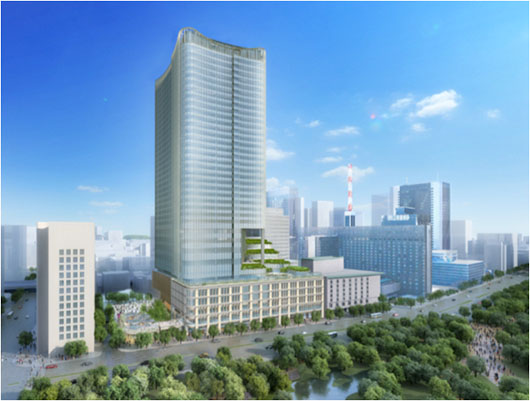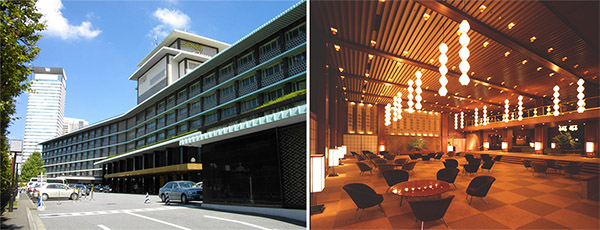Details of Akasaka’s 44-storey condominium announced

Details on Park Court Akasaka Hinokicho The Tower (previously the Akasaka 9 Chome Tower Project) have just been released. The 170m tall, 44-storey condominium, which was designed by Nikken and famed architect Kengo Kuma, is currently under construction on the northern side of Tokyo Midtown.
The high-rise will contain 322 apartments, of which just 163 (50%) will be available for sale. The remainder will go to landholders and participants of the development. The two and three-bedroom apartments will range in size from 57.61 ~ 203.96 sqm (620 ~ 2,195 sq ft). Layouts are cleverly designed and do not contain any windowless bedrooms that you may find in cheaper developments. The largest apartment, a 203 sqm penthouse, includes two full bathrooms, while the rest of the apartments have 1 bathroom.
Sales will begin in September October November 2015 . Prices have yet to be announced, but with apartments in other recent high-rises in Akasaka selling for around 2,000,000 Yen/sqm, it is likely that we will see comparative pricing in this new project. There have been rumours that apartments could be priced as high as 3,000,000 Yen/sqm.Read more
Meguro Station high-rise residential development draws huge interest

The large redevelopment on the eastern side of Meguro Station is garnering a large amount of attention with the sales office overwhelmed with inquiries. Tours of the sales showroom are now booked solid for the next two months. The sales office received 18,000 requests for property brochures, three times the number they had anticipated. Many of the inquiries were from prospective buyers in their 30s and 40s. A third of the inquiries were from residents in Shinagawa, Meguro and Minato-ku.
The model room opened in early April, and the first round of sales is scheduled to start in early June. Apartments will be offered for sale in stages, with almost 40% of the apartments being offered in the first round. Interested buyers will be required to submit applications during the sales periods, with lucky buyers selected via a lottery-type system.
The 80 billion Yen project includes two residential towers containing 940 apartments and a 27-storey office tower. Tokyo Tatemono, Daiichi Life Insurance, Taisei Kensetsu and Takenaka Corporation are the four developers.Read more
Construction to start on Shibuya Miyashitacho Project

Miyashitacho Realty, a corporation funded by Tokyu Corporation, Tokyu Construction, Taisei Corporation and Sapporo Real Estate, will officially begin construction on the Shibuya Miyashitacho Project on March 30.
The 5,000 sqm site is owned by the Tokyo Metropolitan Government and forms part of their ‘Urban Regeneration Step Up Project’. It was originally the site of the the Miyashitacho Apartments. There were originally three apartment buildings, with demolition of the last building fronting Meiji Dori starting recently.Read more
Construction starts on Shin-Hibiya Project

Mitsui Fudosan started construction on the Shin-Hibiya Project on March 23. The 192m tall, 35-storey office tower is expected to be completed by the end of January 2018. London-based architectural firm Hopkins Architects are in charge of the master plan.
The project will help to enhance the area's image as centre for international business and the arts. The retail component will include Toho Cinemas, and will be the largest cinema complex in central Tokyo. This area has a long history as a theatre district. Toho, the producer of the Godzilla franchise, was founded nearby.Read more
600 billion Yen project announced for Yaesu

Mitsui Fudosan and Tokyo Tatemono have plans for a 600 billion Yen (5 billion USD) redevelopment on the eastern side of Tokyo Station. Two buildings up to 250 meters tall will be built in the Yaesu 1 and 2 Chome districts. The developers are considering including residential, retail, education, cultural and medical facilities with English-speaking staff in the complex. The Yaesu area currently has a resident population of just 110 people, so residential supply has been very limited.
The redevelopment site is located in a National Strategic Special Zone. These zones have been created to encourage the creation of full-service business districts that are internationally competitive. Developers may receive allowances to provide for extra floor-area ratios and foreign companies may receive additional benefits to locate in these areas.Read more
Construction of Akasaka's latest high-rise to begin today
 Taisei Corporation will begin construction of a 44-storey residential apartment tower in Akasaka 9 Chome from today.
Taisei Corporation will begin construction of a 44-storey residential apartment tower in Akasaka 9 Chome from today.
The Akasaka 9 Chome North District Redevelopment is located on the northern side of Tokyo Midtown. The 4,656 sqm site was originally a densely packed neighbourhood of two and three-storey wooden homes, a kindergarten and small park.
The new apartment building will be 170m tall with 322 apartments and 44 floors. It will be taller than Akasaka Tower Residence (159m), Park Court Akasaka The Tower (157m) and Roppongi Hills Residence B Tower (156m).Read more
Bottega Veneta joins fight to save Hotel Okura

Fashion and architecture go hand in hand, and pieces designed by some of the great designers can remain timeless for generations. Tomas Maier, the creative director of Italian fashion house Bottega Veneta, is hoping to spread awareness of some of Japan’s modernist architecture that is at risk of being demolished and lost forever. Of particular interest in Maier's campaign is the Hotel Okura Tokyo, designed by Yoshio Taniguchi and completed in 1962, which is scheduled to close and be demolished later this year.Read more
